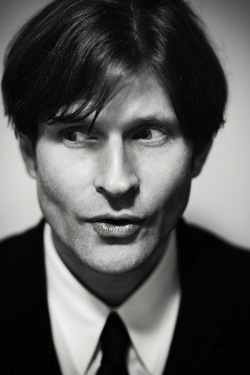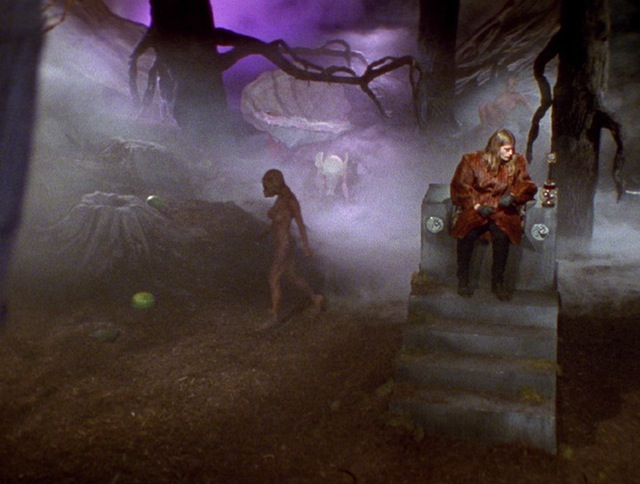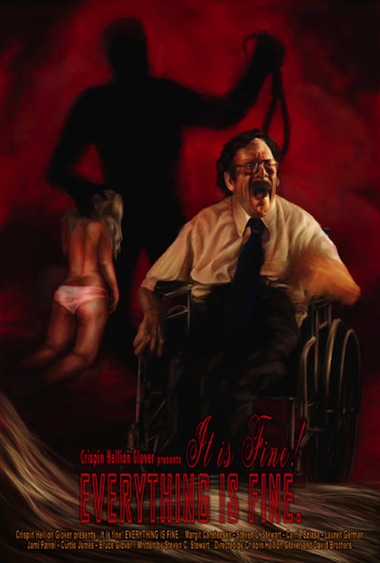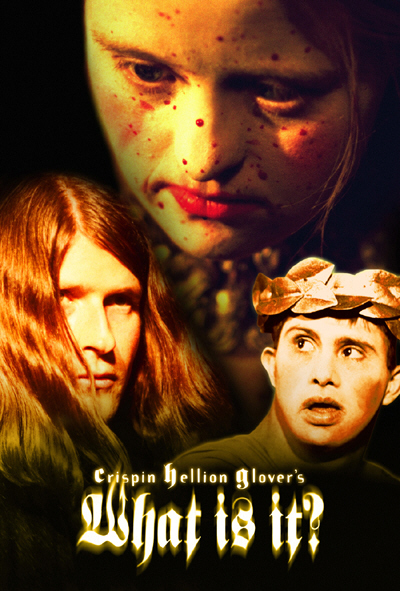Interview: Crispin Hellion Glover Talks About His Craft And Why It's Important For Culture To Question Taboo Subjects
By Scott Lucas in Arts & Entertainment on Jan 30, 2014 5:20PM

Crispin Glover
I've spent more of my teenage years than I care to admit quoting his character, Layne, from River's Edge—so I was more than a little psyched to talk to him in preparation for his return to the Music Box tomorrow with his Big Slide Show Part 2, a touring presentation that mixes Q&A, live readings, and a screening of his 2007 masterpiece It Is Fine! EVERYTHING IS FINE.
Chicago fans of Glover's collective cup runneth over; in addition to the performance at the Music Box, Glover will inaugurate the "In Conversation With Great Minds" series tonight at the DePaul Humanities Center, and returns to the city next Friday at The Patio Theater with the Big Slide Show Part 1 (featuring a screening of his first film What Is It?). If that's not enough for you, I suppose you could follow him across the country and you can see all the dates the slideshow will be appearing. On to the interview (which, for the record, has been heavily edited).
CHICAGOIST: Welcome back to Chicago, Crispin. So this the first stop on the tour, right?
CRISPIN GLOVER:Thanks! Yes it is the first stop.
C: You've been to the Music Box quite a few times over the years and seem to have started a trend of filmmakers going on tour with their movies--Kevin Smith and Tommy Wiseau are notable examples of this. What made you decide to take your films directly to the people so many years ago?
CRISPIN GLOVER: The live aspects of the shows are not to be underestimated. This is a large part of how I bring audiences in to the theater and a majority of how I recoup is by what is charged for the live show and what I make from selling the books after the shows.
For Crispin Hellion Glover's Big Slide Show I perform a one hour dramatic narration of eight different books I have made over the years. The books are taken from old books from the 1800s that have been changed in to different books from what they originally were. They are heavily illustrated with original drawings and reworked images and photographs.
I started making my books in 1983 for my own enjoyment without the concept of publishing them. I had always written and drawn and the books came as an accidental outgrowth of that. I was in an acting class in 1982 and down the block was an art gallery that had a book store upstairs. In the book store there was a book for sale that was an old binding taken from the 1800s and someone had put their art work inside the binding. I thought this was a good idea and set out to do the same thing.
People sometimes get confused as to what Crispin Hellion Glover’s Big Slide Show (Parts 1&2) is so now I always let it be known that it is a one hour dramatic narration of eight different profusely illustrated books that I have made over the years. The illustrations from the books are projected behind me as I perform the show. There is a second slide show now that also has 8 books. Part 1 is performed if I have a show with Part 1 of the “IT” trilogy and then on the subsequent night I will perform the second slide show and Part 2 of the “IT” trilogy. The second slide show has been developed over the last several years and the content has changed as it has been developed, but I am very happy with the content of the second slide show now.
The fact that I tour with the film helps the distribution element. I consider what I am doing to be following in the steps of vaudeville performers.
There are benefits and drawbacks about self distributing my own films. In this economy it seems like a touring with the live show and showing the films with a book signing is a very good basic safety net for recouping the monies I have invested in the films
There are other beneficial aspects of touring with the shows other than monetary elements. This also makes me much more personally grateful to the individuals who come to my shows as there is no corporate intermediary. The drawbacks are that a significant amount of time and energy to promote and travel and perform the shows. Also the amount of people seeing the films is much smaller than if I were to distribute the films in a more traditional sense.

Crispin Hellion Glover and Kiva on the set of 'What is it?'
C: You will be showing clips from a work in progress. Is this part of the "It" trilogy or something else entirely?
CRISPIN GLOVER: I will be showing ten minutes of edited footage from my next feature film. This will not be IT IS MINE. Nor will it have anything to do with the “IT" trilogy.
C: I first noticed you in the role of "Dead Fuck" in Friday the 13th Part IV.
CRISPIN GLOVER: The character I played in Friday the 13th Part IV was named Jimmy.
C: Oops. Sorry about that. Although those movies were very successful, they weren't exactly well respected. But you definitely stood out as one of the more entertaining characters in the series.
CRISPIN GLOVER: As a working actor needing to continue my career, I agreed to act in the film. I had a feeling that there wold be something humorous about having appeared in that franchise. It had, of course, continued to be an extraordinarily popular franchise. I am glad I did the film.
C: At what point in your career did you think you wanted to make your own films? Did you see acting as a way to do that or are the two unrelated in your mind?
CRISPIN GLOVER: Like many filmmakers, I shot super 8 films when I was 13 and upward. I started making a movie shot on video in the 1980s called The Backward Swing. It is based on one of the books in my live show. I have recently digitized that information and it will make an interesting movie when I edit that together.
C: My absolute favorite role of yours is Layne in River's Edge. Tim Hunter was kind of the John Hughes of juvenile delinquent movies already when he wrote Over The Edge in '78, but with the number of up and coming actors in River's Edge, it was almost like the alternative Breakfast Club.
CRISPIN GLOVER: Thank you! I am proud of that film to this day and of course it was great working with the whole cast and crew.
C: The cinematographer, Frederick Elmes, shot both River's Edge and Blue Velvet in the same year, did that have anything to do with you getting cast in Wild at Heart?
CRISPIN GLOVER: Fred Elmes did shoot both River's Edge and Blue Velvet in the same year. And, of course, so did Dennis Hopper. They were talking about working on it on the set. I had known Fred Elmes’ work from Eraserhead which was a very important film to me when I was 16. As much as I love David Lynch and his work - Eraserhead is still my favorite film of his.
C: Of all the directors you were working with at the time, it seems to me that David Lynch was the closest to you in sensibility. Would that be fair to say?
CRISPIN GLOVER: David Lynch was of course great to work with and he offered to be the executive producer of IT IS MINE. It was of course a very nice thing for him to offer and I am still grateful to him for that to this day. Werner Herzog has also been extremely kind and a great person to speak to. To have admired both of these great people from a young age and for them both to have been nice to me and helpful in mentor-like positions is something I am grateful for.
C: George McFly has to be the character you're most famous for—but you had a falling out with the producers of Back To The Future 2 over their use of of another actor made up to look like you. In retrospect, it looks like you were standing up for the rights of actors to take ownership of the characters they create. This kind of thing still happens in commercials, with dead movie stars shilling for products that they may never have even heard of when they were alive.

Movie Poster for 'It is Fine! EVERYTHING IS FINE'
What the producers did that was illegal was as follows: The producers used the molds that were taken of my face from the original film and had prosthetics made to be placed on another actor to make them look like me, and then inter-spliced a small amount of footage of me from the original film with the actor in prosthetics to resemble me in order to fool audiences in to believing I was in the film.
There was an actress that was replaced with another actress in the film, but they simply cast another actor in that role with no prosthetics. Had they simply cast another actor to play the role of George McFly there would have been no criminal activity on the part of the producers and there would have been no lawsuit. Since they did not own my face, nor make an financial agreement with me to use my facial features, what they did was stealing. And that's why there was a lawsuit, and why there are rules in the Screen Actors Guild that make it so producers can never to this kind of thing again.
Probably the most negative aspect about it is that Bob Gale—who was a co-producer and co-writer and one of the main architects of the illegal activity—has decided that it serves him best to lie about what happened in order to justify partaking in something that led to the producer’s illegal activity. He has falsely stated that I asked for the same amount of money that Michael J. Fox was getting. This statement by him is a complete fabrication. He is doing this to take the focus off the fact that what he and his fellow producers did was illegal, by definition of the word. He does not want to face that fact. To skirt the issue, Bob Gale has lied to millions of people on the Back to the Future DVD commentaries about how the negotiations were handled. I would not normally discuss this sort of thing, but people believe what he has stated as true.
Again, I am proud of the lawsuit and standing up against illegal activity that caused proper precedents and bylaws in to be set in the Screen Actors Guild. If I were put in the exact same situation today I would react in the exact same way. Thank you for asking about it in that detailed way. I am glad to help clarify.
C: You ended up working again with Back To The Future director Robert Zemeckis on Beowulf. What were the talks like to get that to happen? Was there a kind of closure achieved?
CRISPIN GLOVER: I was surprised when I heard there was interest from Robert Zemeckis for me to play Grendel in Beowulf. I never brought up Back to the Future and had an excellent working relationship with Robert Zemeckis on Beowulf and like both my performance and the film.
The fact I was treated fairly on Beowulf put Robert Zemeckis in a far better light to me than someone like Bob Gale.
C; In your new film, you're working with your dad, Bruce Glover. One of his more famous roles is Mr. Wint in Diamonds Are Forever. Looked at in that context, your role of the assassin in Charlie's Angels is sort of like carrying on the family name of villainy. Did any of that play into your portrayal?
CRISPIN GLOVER: The suit I wore in Charlie’s Angels was based on a suit I gave to the wardrobe department that my father had worn in Diamonds Are Forever. I was aware that there was a structural similarity to the character my father played in Diamonds Are Forever and the character I played in Charlie’s Angels.
C: What about your decision to get rid of all your character's dialogue?
CRISPIN GLOVER: After I read the screenplay, and the producers wanted to know what my thoughts were, I let them know I thought it should be a character played without dialogue. McG, the director, was very enthusiastic immediately and that ended up happening. I had much more influence on that character than virtually any character I have played—be it in a large or small film. Another thing that came from me was the hair fetishism. There were a series of circumstances that let that all the various influences happen. The funny thing is that I was able to fund the shooting of It is fine! EVERYTHING IS FINE with my salary from the first Charlie’s Angels film.
After Charlie’s Angels came out it did very well financially and was good for my acting career. I started getting better roles that also paid better and I could continue using that money to finance my films that I am so truly passionate about. I have been able to divorce myself from the content of the films that I act in and look at acting as a craft that I am helping other filmmakers to accomplish what it is that they want to do. Usually filmmakers have hired me because there is something they have felt would be interesting to accomplish with using me in their film and usually I can try to do something interesting as an actor. If for some reason the director is not truly interested in doing something that I personally find interesting with the character then I can console myself that with the money I am making to be in their production I can help to fund my own films that I am so truly passionate about. Usually, though I feel as though I am able to get something across as an actor that I feel good about. It has worked out well.

Movie poster for 'What Is It?'
What does it mean that taboo has been ubiquitously excised in this culture’s media? What does it mean to the culture when it does not properly process taboo in it’s media? It is a bad thing because when questions are not being asked because these kinds of questions are when people are having a truly educational experience. For the culture to not be able to ask questions leads towards a non educational experience and that is what is happening in this culture. This stupefies this culture and that is of course a bad thing. So What is it? Is a direct reaction to the contents this culture’s media. I would like people to think for themselves.
C: And finally—-I hate to bring up your infamous David Letterman appearances—-but it seems to me that you were paving the way for Joaquin Phoenix's similar appearance a few years ago. Obviously, there was a bit of Andy Kaufman-esque performance art in what both you and Joaquin were doing—but while that was expected of Kaufman, what you were doing was much more out of the blue. More shocking.
CRISPIN GLOVER: I have neither confirmed or denied in the media whether or not that was me on the 1987 Late Night with David Letterman appearance. If asked I go in to a lot of detail about it at my shows.
See Cripsin Glover tonight at DePaul, tomorrow at The Music Box or next Friday at The Patio. Not in Chicago? Here's a full list of Glover's upcoming appearances.